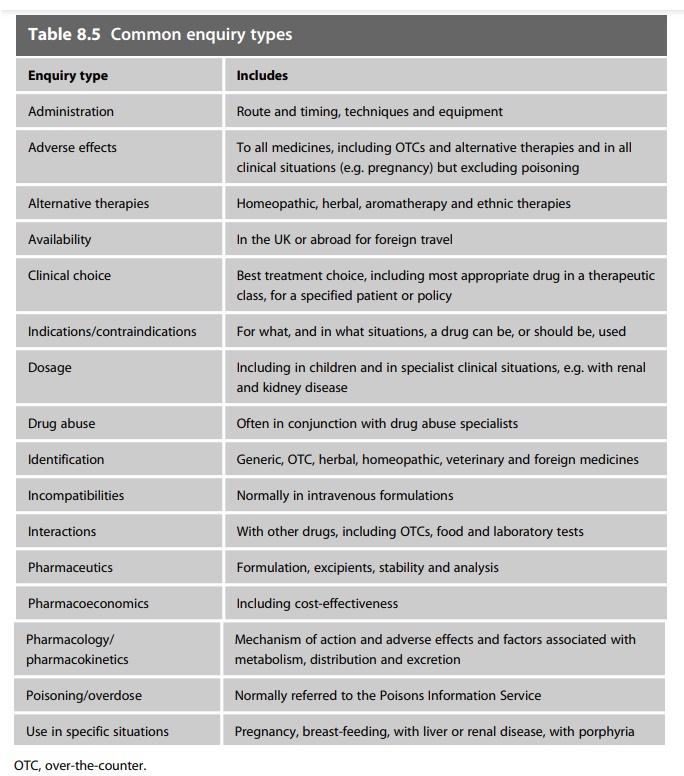Activities
| Home | | Hospital pharmacy |Chapter: Hospital pharmacy : Medicines information
The activities of MI services can arbitrarily be divided into two main groups, reactive and proactive, although this presents an oversimplified picture.
Activities
The activities of MI
services can arbitrarily be divided into two main groups, reactive and
proactive, although this presents an oversimplified picture.
Reactive
The reactive service
is mainly focused on enquiry-answering for the broad range of users of the
service described previously. Most enquiries to the MI service are directly
related to individual patient care, although many are concerned with developing
policy and guidelines, pharmacy practice, pharma-ceutical issues,
pharmaceutical and medicines research and teaching support. The service will
answer enquiries on any aspect of the prescribing, supply, formulation and
administration of medicines, where possible from an evidence-based perspective.
Common types of clinical enquiry are listed in Table 8.5.

Providing an
effective response to a clinical problem is a multiple-stage process and
requires a wide range of skills and knowledge. The main com-ponents of the
enquiry-answering process can be simplified as:
· contact with the
enquirer
· identification of
the problem
· acquiring
appropriate and adequate background information
· establishing the
urgency of the enquiry and prioritising with other enquiries
· retrieval,
utilisation and critical appraisal of information relevant to the enquiry. This
may include referral to a subject specialist if appropriate
· preparing the
response
· presentation of
response in most appropriate form, e.g. letter or verbally
· documenting the
whole process
· feedback and
follow-up if necessary to determine outcome and need for further information.
Guidelines and
standard procedures have been established nationally to facili-tate this
process being undertaken to a consistent and high-quality level across the UK.
Enquiry-answering is the main activity on which various quality control and
audit processes are performed to ensure that the service is meeting its objectives,
within a clinical governance framework, in facilitating safe and effective
medicines use in patients.
Proactive
The proactive part
of the service includes a wide range of outputs, which can be partly or wholly
produced by the MI service. The involvement of individual local MI services in
these activities varies, depending on both local need and service resourcing.
Proactive outputs aim to provide support to prescribing policy and strategy
construction, guideline production and implementa-tion, and education,
knowledge and professional development support. These activities include
bulletins and newsletters; standardised, evidence-based answers to common
questions (over 200 ‘Medicines Q&As’ are pub-lished on NeLM and updated
regularly); current awareness publications; horizon-scanning and evidence-based
appraisals of new medicines; and vital tools in strategic medicines management
and part of proactive MI outputs.
Related Topics
